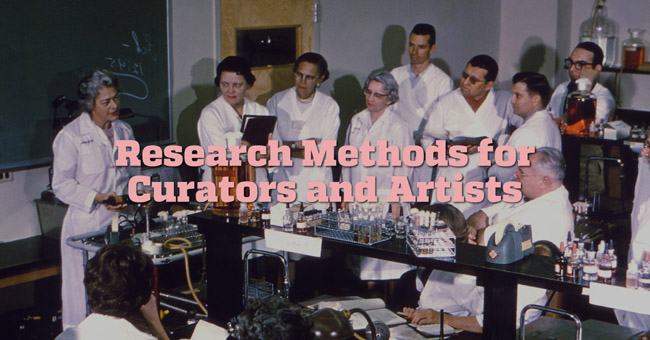
Research Methods for Curators and Artists
Research Methods for Curators and Artists
Online course by Node Center with Jai McKenzie
Duration: Oct 11 – Nov 1, 2016
Enroll before: Oct 8, 2016
Learn to bring out the best in your topic by undertaking in-depth and creative research before starting a project. Each week we will go through different phases of research, starting from defining your topic to knowing where to look for information, organising your content and finally editing and refining information to move your research into the real world.
Research methods for curators and artists will equip you with the tools and methods for gathering ideas and information – from classic academic approaches to fieldwork and experimenting with prototypes. Throughout the course we will examine how to use brainstorming and mind mapping techniques to go beyond the boundaries of your topic; get the most from online and real world content; and learn how to systematise your resources whether they be books, artworks, locations or people.
Each week, participants will directly apply the methods and techniques to a topic of their choosing. By moving through the research phases and gaining feedback along the way, participants will develop a strong foundation of information that could be used in a project.
Week 1: First steps – from defining your topic to developing a plan of action
• Introduction
• Defining a topic through main and sub topics
• Brainstorming and mind mapping techniques
• First introduction to different research resources
• Tools and methods for gathering ideas and information (digital vs. analogue approaches)
• How to access your research easily (software and note apps)
• Making an action plan for research
Week 2: Gathering resources: where to look? (part 1: books, articles, internet,databases)
• How to use the library, online searches and resources
• Tips on how to read to get the most information in the fastest way
• Tips on in-text notes to keep track of information
• Optimizing google search
• Online databases and collections, where to research
• Researching art projects and art works related to your topic
Week 3: Gathering resources: where to look? (part 2: spaces, people and prototypes)
• Accessing people and communities
• Learning from people: interview techniques
• Empathy and alternative perspective strategies
• Visiting sites of interest: how to document and map your visit
• Creating models and experiments as prototypes for projects
Week 4: Refining your research (evaluating, getting feedback, revising…)
• Evaluating your prototype: how to ask for feedback
• Revise and refine ideas: moving back before moving forward
• Editing your research: kill your darlings
• Know when to stop! How to move your research forward into the real world.
More info: www.nodecenter.net








